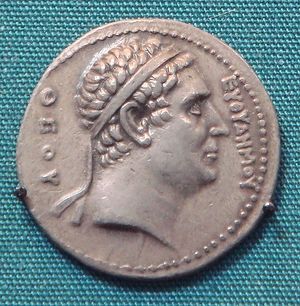Euthydemus I
Euthydemus I (ca. 260 f.Kr. - 200/195 f.Kr.), Greco-Bactrian king in about 230 or 223 BCE according to Polybius.[1], he is thought to have originally been a Satrap of Sogdiana, who overturned the dynasty of Diodotus of Bactria and became a Greco-Bactrian king. Strabo, on the other hand, correlates his accession with internal Seleucid wars in 223/221 BCE. His kingdom seems to have been substantial, including probably Sogdiana to the north, and Margiana and Ariana to the south or east of Bactria. [edit] Biography
Euthydemus was allegedly a native of Magnesia (though the exact site is unknown), and was the father of Demetrius I according to Strabo [2] and Polybius[3]; he could possibly have had other royal descendants, such as Antimachus I.
Little is known of his reign until 208 BCE when he was attacked by Antiochus III the Great, whom he tried in vain to resist on the shores of the river Arius, the modern Herirud. Although he commanded 10,000 horsemen, Euthydemus initially lost a battle on the Arius [3] and had to retreat. He then successfully resisted a three-year siege in the fortified city of Bactra, before Antiochus finally decided to recognize the new ruler, and to offer one of his daughters to Euthydemus's son Demetrius around 206 BCE [3].
Classical accounts also relate that Euthydemus negotiated peace with Antiochus III by suggesting that he deserved credit for overthrowing the descendants of the original rebel Diodotus, and that he was protecting Central Asia from nomadic invasions thanks to his defensive efforts:
"...for if he did not yield to this demand, neither of them would be safe: seeing that great hords of Nomads were close at hand, who were a danger to both; and that if they admitted them into the country, it would certainly be utterly barbarised." (Polybius, 11.34).
The war lasted altogether three years and after the Seleucid army left, the kingdom seems to have recovered quickly from the assault. The death of Euthydemus has been roughly estimated to 200 BCE-195 BCE, and the last years of his reign probably saw the beginning of the Bactrian invasion of India. Barbaric copy of a coin of Euthydemus, from the region of Sogdiana. The legend on the reverse is in aramaic. Such coins suggest that Euthydemus ruled, and then lost the territory of Sogdiana.
There exist many coins of Euthydemus, portraying him as a young, middle-aged and old man. He is also featured on no less than three commemorative issues by later kings, Agathocles, Antimachus I and one anonymous series[4]. He was succeeded by Demetrius, who went on to invade northwestern India.
